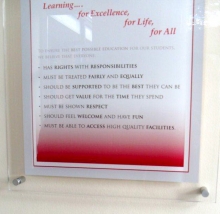A school’s vision and mission serve as the foundation for schools who are aiming to strengthen and develop effective systems and structures to assist with behaviour and learning improvement. Most schools working with the NBSS on Code of Behaviour Reviews began their work by developing or reviewing their vision and/or mission statements. Schools involved in the Solution Oriented Schools (SOS) project began their Code of Behaviour Review work by developing a Core Professional Purpose (a CPP articulates what a school is there to deliver) for their school as the first step in implementing Tier One of the whole school SOS system. Organisational Principles (OPs – culture forming standards on which the school’s structures, systems, policies and practices are developed, written and measured) were then developed to support this Core Professional Purpose.
Many of the schools involved in the NBSS SOS project viewed the process of working on their school’s CPP and OPs as an opportunity to involve all members of the school community - staff, students and parents – in work on and not just in their school. All stages of the process were co-ordinated and facilitated by the SOS Facilitators’ Team called the F-Team (similar to the Positive Behaviour Strategy Team) who volunteered for the task. The main stages of the process in one school were as follows:
• A staff day was held where all staff in the school worked on their vision of a ‘great school.’ Among the comments were ‘a school where learning for excellence, for life, for all is evident; a school where learning, endeavour, achievement, respect and nurture is promoted; learning, growing, succeeding together’. This began the process of developing key aspects of the CPP and OPs. The F-Team collated all staff input and also developed templates for working with parent during a parents’ evening. This evening was also facilitated by members of the F-Team.
• The F-Team then worked with all the students in the school (one period per class) to find out their vision of a ‘great school’. Among the comments were – ‘a place where students can mature and grow, develop their talents and prepare for life; a challenging, supportive learning environment where students are valued all the time; a welcoming, caring, friendly school with a fun atmosphere’. During these sessions over 400 students also completed a short questionnaire on their school’s strengths. Questions on areas that need further development were also included in the questionnaire. The students identified the accessibility of the toilet areas and the locker and storage areas as most needing attention. It was decided that a student group would be formed to collate the student data and comment further on the findings. This further involved students in the process as well as contributing to the development of their research skills as they collated and analysised the data gathered. This student group, consisting of representative from all year groups, was also joined by parents from the Parent Council. In all, ten after-school sessions took place with students, parent representatives and F-Team representatives. From this work a student CPP and OPs were developed for the school.
• The F-Team then set about combining the staff, parent and student CPP and OPs and organised further consultations with all three groups to secure agreement on the final CPP and OP statements. The final CPP and OPs decided on were as follows:
Learning for excellence, for life, for all.
To ensure the best possible education for our students (the school) believes that everyone:
a. has rights with responsibilities
b. must be treated fairly and equally
c. should be supported to be the best they can
d. should get value for the time they spend
e. must be shown respect
f. should feel welcome anf have fun
g. must be able to access high quality facilities.
• A week long in–school launch of the school’s Core Professional Purpose (CPP) and Organisational Principles (OPs), was then organised. The CPP and OPs were displayed around the school and each morning, during the first class, teachers worked with students on the meaning and value of each principle. Each session involved discussion, allegorical stories, stimulating questions and examples to help the students reflect on and think about the CPP and each OP. The Principal also spoke about the CPP and individual OPs on the intercom each morning.
• A formal launch day was also organised by the F-Team and two past pupils, who had achieved success at national level in sport, were invited to join the school community on their special day – students and members of the F- Team mounted a display and spoke about the CPP and OPs, a slideshow summarised recent events in the school, the Deputy Principal spoke about the process undertaken and the vision for the future of the school, the school choir performed two songs and the two past pupils with the Principal unveiled a plaque with the CPP and Ops. The launch was brought to a close with an inspirational and thought-provoking address by the Principal.
• The CPP and OPs are now displayed around the school and on the special plaque at the main entrance. The next planned step in their work is the strengthening and development of key structures, systems, policies and practices that will support and bring to life their Core Professional Purpose and develop a way of working that also meets their Organisational Principles.

